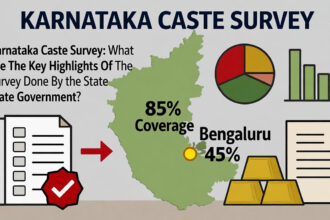
📍 Gwalior, Madhya Pradesh – A political and religious storm is unfolding in Gwalior’s Jaurasi village over the construction of a ₹20 crore “Ambedkar Dham.” The site, envisioned as a tribute to Dr. B.R. Ambedkar, is allegedly encroaching upon the traditional land of a revered 200 year old Hindu shrine Shri Hanuman Mandir.
- ₹20 Crore ‘Ambedkar Dham’ Under Fire for Encroaching Hindu Temple Land
- The Ambedkar Irony: A Monument Against His Teachings?
- ₹20 Crore Ambedkar Dham Project Sparks Public Outcry
- State Sanctioned Disrespect?
- Growing Demands for Judicial Inquiry on Ambedkar Dham
- The 22 Vows of Dr. B.R. Ambedkar
- Ambedkar’s Critique of Hinduism
- Why This Matters in the Ambedkar Dham Controversy
- Final Note
₹20 Crore ‘Ambedkar Dham’ Under Fire for Encroaching Hindu Temple Land
The Jaurasi Hanuman Mandir, deeply rooted in local tradition, has been a spiritual cornerstone for the region’s Hindu community for over two centuries. Now, the construction of Ambedkar Dham just 800 meters away has sparked not just concern over land usage, but also allegations of cultural insensitivity and political appeasement.
“It’s not just about land,” says a local devotee. “This is about faith. About a state system that disregards temples and pours taxpayer money into building monuments for someone who stood firmly against Hindu dharma.”

The Ambedkar Irony: A Monument Against His Teachings?
Dr. Ambedkar, the head of the drafting committee of the Indian Constitution and a known critic of Hinduism, rejected idol worship and Hindu deities upon converting to Buddhism. In his famous 22 vows, he vowed never to regard Hindu gods as divine or participate in Hindu rituals.
Yet, the Indian state continues to fund and erect statues and monuments in his name – a move critics call deeply ironic and hypocritical, particularly as Hindu temples remain under strict state control and financial strain.
₹20 Crore Ambedkar Dham Project Sparks Public Outcry
The scale of the project ₹20 crore sanctioned has further intensified public resentment. Onlookers describe a scene of tight police deployment, bulldozers, and fenced construction zones, heightening the sense of occupation.
Government emblems and political posters on site indicate clear state sponsorship, leading many to question why such public resources are being allocated to identity-based monuments, while ancient temples struggle for survival.
State Sanctioned Disrespect?
Many see the controversy as part of a wider pattern of selective state patronage. While Hindu temples are legally and financially restricted, state governments continue to endorse and build politically charged structures.
Ambedkar opposed idol worship. Then why build statues and dhams in his name?” asks a visibly upset temple priest. “And why on temple land?”
Growing Demands for Judicial Inquiry on Ambedkar Dham
Hindu organizations and local leaders have called for a judicial probe into the land acquisition and alleged encroachment. There is increasing demand for a transparent investigation into how a government-funded project came to be situated so close to a historically significant temple.
Locals in Jaurasi fear that their sacred space is being bulldozed literally and spiritually. Tensions remain high, and with political temperatures rising, this controversy may soon ripple beyond Gwalior and become a flashpoint in the national debate on religious rights, state policy, and cultural preservation.
Follow us on X for real time updates.
Stay tuned with The News Drill for more updates.
Hindi Version: Ambedkar Dham Controversy
Contact us: contact@thenewsdrill.com
The 22 Vows of Dr. B.R. Ambedkar
On 14 October 1956, at Nagpur, Dr. B.R. Ambedkar and over 5 lakh of his followers converted to Navayana Buddhism, marking a historic break from the Hindu caste order. Before converting, Ambedkar made his followers take 22 vows, which were explicit in their rejection of Hindu gods, rituals, and caste-based practices.
Full List of the 22 Vows
- I shall have no faith in Brahma, Vishnu and Maheshwara; nor shall I worship them.
- I shall have no faith in Rama and Krishna, who are believed to be incarnations of God, nor shall I worship them.
- I shall have no faith in Gauri, Ganapati and other gods and goddesses of Hindus, nor shall I worship them.
- I do not believe in the incarnation of God.
- I do not and shall not believe that Lord Buddha was the incarnation of Vishnu. I believe this to be mere false propaganda.
- I shall not perform Shraddha nor shall I give pind-dan.
- I shall not act in a manner violating the principles and teachings of the Buddha.
- I shall not allow any ceremonies to be performed by Brahmins.
- I shall believe in the equality of all human beings.
- I shall endeavor to establish equality.
- I shall follow the noble eightfold path of the Buddha.
- I shall follow the ten paramitas prescribed by the Buddha.
- I shall have compassion and loving-kindness for all living beings and protect them.
- I shall not steal.
- I shall not tell lies.
- I shall not commit carnal sins.
- I shall not take intoxicants like liquor, drugs, etc.
- I shall endeavor to follow the right path and behave according to the teachings of the Buddha.
- I shall renounce Hinduism, which is harmful to humanity and impedes the advancement and development of humanity because it is based on inequality.
- I shall embrace Buddhism with deep conviction and understanding.
- I shall keep my conduct as a Buddhist.
- I shall follow the teachings of the Buddha in letter and spirit.
Ambedkar’s Critique of Hinduism
Dr. Ambedkar’s rejection of Hinduism was not limited to personal belief — it was philosophical, political, and legal. His criticism centered around:
The Caste System
- Ambedkar viewed caste as the core evil of Hinduism.
- He wrote: “Caste is not just a division of labor; it is a division of laborers.”
- In Annihilation of Caste, he critiqued Hindu scriptures (like Manusmriti and Vedas) for codifying inequality.
Idol Worship
- Ambedkar rejected the concept of God in human form, and was strongly against idol worship.
- In the 22 vows, he explicitly names Hindu deities (Ram, Krishna, Ganesh, Vishnu, Mahesh, etc.) and vows never to worship them.
- He considered idol worship a Brahminical tool used to maintain control over lower castes.
Hindu Scriptures and Rituals
- Ambedkar denounced texts like the Manusmriti, which he famously burned in 1927 as a symbol of rebellion.
- He rejected Brahminical rituals, such as shraddha, pind daan, and all ceremonies involving Brahmin priests.
Hindu Social Order
- Ambedkar argued that Hinduism had no concept of equality and that its core was based on exclusion, hierarchy, and oppression.
- His conversion to Buddhism was an act of socio-political liberation, not just spiritual transformation.
Why This Matters in the Ambedkar Dham Controversy
Given that Ambedkar himself vowed never to worship Hindu deities, and condemned the temple system as oppressive, critics argue:
Constructing a “dham” or sacred structure in his name — especially near or over temple land — contradicts both Ambedkar’s vows and his rationalist philosophy.
The use of state funds to build a monument with spiritual connotations tied to a man who rejected all religion in its dogmatic form is viewed as politically motivated rather than ideologically consistent.
Some say it appropriates Ambedkar’s legacy for vote bank politics while disregarding Hindu sentiments and temple traditions.
Final Note
Dr. Ambedkar’s 22 vows represent one of the most radical acts of religious defiance in modern Indian history. His rejection of Hinduism was total not merely of its caste system but of its gods, texts, and authority.
Ambedkar Dham in Gwalior near Hanuman Mandir is just vote bank politics by MP BJP Government & playing with sentiments of Hindus as well as disrespect of Sanatana Hindu Bhagwan, Gods & Goddesses.
















